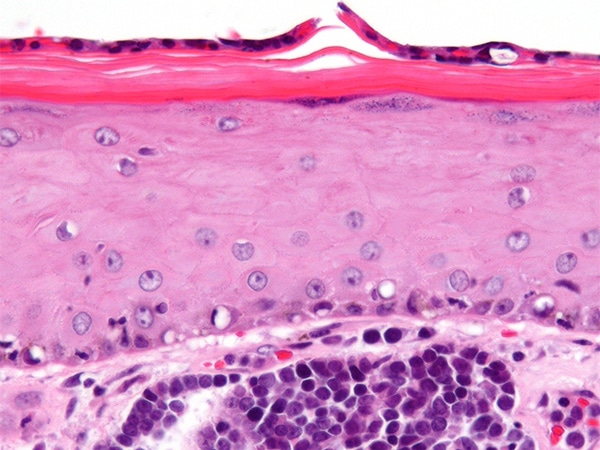Increasing Immunotherapy Options for Rare Skin Cancer
The FDA approval of pembrolizumab for treating certain patients with Merkel cell carcinoma makes it the second immunotherapeutic approved for treating this rare skin cancer.

The U.S. Food and Drug Administration (FDA) recently approved expanding the use of pembrolizumab (Keytruda), a type of immunotherapeutic called a checkpoint inhibitor, to include the treatment of certain patients with a rare, aggressive type of skin cancer called Merkel cell carcinoma.
Pembrolizumab is intended for adult and pediatric patients with recurrent locally advanced or metastatic Merkel cell carcinoma. It is the second checkpoint inhibitor to be approved for treating this type of cancer. The first was avelumab (Bavencio), which was approved for treating adults and pediatric patients ages 12 and older with metastatic Merkel cell carcinoma in March 2017.
Merkel cell carcinoma gets its name from the cells in which it arises: the cells in the top layer of the skin that are called Merkel cells. Although it is a rare disease, the U.S. Merkel cell carcinoma incidence rate has increased more than four-fold in recent decades, according to data from the National Cancer Institute. In 1986, there were 0.15 new cases of Merkel cell carcinoma per 100,000 U.S. adults. This rose to 0.7 per 100,000 in 2013, which translates to almost 2,500 new cases of the disease that year.
Overall, the 10-year relative survival rate for Merkel cell carcinoma is estimated to be 57 percent, but it varies by stage of diagnosis. The 10-year relative survival rate for patients diagnosed with early-stage disease is 71 percent, but for those diagnosed with metastatic disease it is 20 percent. The outcomes for patients are so poor that it is the second deadliest form of skin cancer after melanoma.
The approval of pembrolizumab for treating adult and pediatric patients with recurrent locally advanced or metastatic Merkel cell carcinoma was based on results from the phase II KEYNOTE-17 clinical trial, which showed that 12 of the 50 enrolled (24 percent) had complete tumor shrinkage and 16 (30 percent) had partial tumor shrinkage. These data are consistent with early results from the trial, which were presented by Paul Ngheim, MD, PhD, at the AACR Annual Meeting 2016.
Pembrolizumab works by releasing a brake called PD-1 on cancer-fighting immune cells called T cells. Because it targets the immune system and not molecules specific to a particular cancer, it has relatively broad utility in the treatment of cancer.
Pembrolizumab was first approved by the FDA in September 2014, for treating melanoma. Since then, it has been approved for treating at least nine other types of cancer, including Merkel cell carcinoma, and for treating patients with any type of solid tumor that is characterized by the presence of specific biomarkers known as microsatellite instability-high or mismatch repair-deficient.
The FDA approval was rendered on Dec. 19, 2018.
